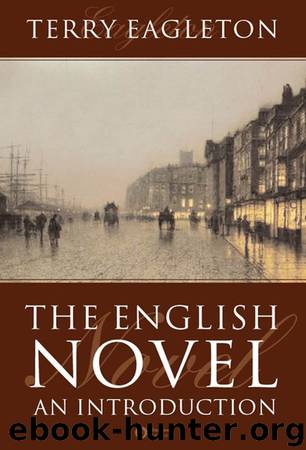The English Novel by Eagleton Terry;

Author:Eagleton, Terry;
Language: eng
Format: epub
Publisher: Wiley
Published: 2013-05-23T16:00:00+00:00
9
THOMAS HARDY
Not all that long ago, a standard account of Thomas Hardy might have run rather like this: Hardy was a self-educated author who struggled his way up from the ranks of the common people, and wrote gloomily fatalistic novels about an English peasant society whose traditional way of life was being undermined by external urban forces. Not a word of that account is in fact true, except perhaps for ‘author’, and to inquire why not might lead us to a more accurate understanding of the man and his fiction.
Hardy was not from the common people. Not everyone who lives outside London is a country bumpkin. He was the son of a rural builder who employed six or seven workmen, and after attending a reputable high school qualified as a professional architect. Far from being self-taught, he was considerably better educated than the great majority of men and women of his age. As Raymond Williams sardonically points out, the patronizing adjective ‘autodidact’, which has been used alike of Hardy, George Eliot and D. H. Lawrence, probably means simply that none of them went to boarding school or Oxbridge.1 Any English writer who did not, yet can still pronounce ‘monocephalous’, must presumably have grubbed his or her knowledge from dusty second-hand tomes scanned by candlelight in a roofless cabin.
Nor did Hardy write of peasants, for the excellent reason that hardly any of them existed in rural England. Technically speaking, a peasant is a farmer who owns and works his own land – and the land enclosures of the late eighteenth century had driven most of this class from the English countryside, in contrast, say, to the situation in France. By Hardy’s time, farming in England had long been a capitalist, market-oriented enterprise based largely upon landowners, tenant farmers and landless labourers. There was thus no sharp social divide between country and city, since the social relations which prevailed in the latter were equally dominant in the former. There was also a rural lower middle class of dealers, craftsmen, shopkeepers, traders, artisans, schoolteachers, cottagers, small employers and the like, with whom Hardy, as an offspring of that class himself, especially identified. It was this class, not the ‘peasantry’, which he saw as preserving the cultural continuities of the countryside; and its steep social decline in his own day meant the catastrophic loss of that precious heritage.
As with most of the classic English nineteenth-century novelists, then, Hardy’s allegiances lay neither with the governing classes nor with the plebeian masses. Instead, he draws many of his major protagonists from the mobile, unstable lower middle class – one trapped between aspiration and anxiety, and therefore typical of some of the central contradictions of the age. In this sense, Hardy could attend to the plight of this obscure social grouping without losing a grip on broader issues. Gabriel Oak of Far From The Madding Crowd starts off as a hired labourer before graduating to become an independent farmer and then a bailiff. Giles Winterborne of The Woodlanders is no simple-minded yokel but a merchant and dealer.
Download
This site does not store any files on its server. We only index and link to content provided by other sites. Please contact the content providers to delete copyright contents if any and email us, we'll remove relevant links or contents immediately.
| African | Asian |
| Australian & Oceanian | Canadian |
| Caribbean & Latin American | European |
| Jewish | Middle Eastern |
| Russian | United States |
4 3 2 1: A Novel by Paul Auster(11763)
The handmaid's tale by Margaret Atwood(7424)
Giovanni's Room by James Baldwin(6780)
Asking the Right Questions: A Guide to Critical Thinking by M. Neil Browne & Stuart M. Keeley(5338)
Big Magic: Creative Living Beyond Fear by Elizabeth Gilbert(5325)
Ego Is the Enemy by Ryan Holiday(4922)
On Writing A Memoir of the Craft by Stephen King(4649)
The Body: A Guide for Occupants by Bill Bryson(4560)
Ken Follett - World without end by Ken Follett(4427)
Bluets by Maggie Nelson(4245)
Adulting by Kelly Williams Brown(4213)
Eat That Frog! by Brian Tracy(4130)
Guilty Pleasures by Laurell K Hamilton(4099)
White Noise - A Novel by Don DeLillo(3818)
The Poetry of Pablo Neruda by Pablo Neruda(3799)
Fingerprints of the Gods by Graham Hancock(3719)
Alive: The Story of the Andes Survivors by Piers Paul Read(3714)
The Book of Joy by Dalai Lama(3675)
The Bookshop by Penelope Fitzgerald(3609)
